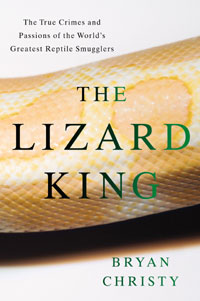For as long as I can remember, I’ve been fascinated by reptiles. Growing up in rural West Texas, I had plenty of encounters with lizards and snakes, and  cultivated an encyclopedic knowledge of the more notorious species. But I never graduated to collector status, and thus never encountered the types of characters and degree of passion documented in Bryan Christy’s new book, The Lizard King: The True Crimes and Passions of the World’s Greatest Reptile Smugglers.
cultivated an encyclopedic knowledge of the more notorious species. But I never graduated to collector status, and thus never encountered the types of characters and degree of passion documented in Bryan Christy’s new book, The Lizard King: The True Crimes and Passions of the World’s Greatest Reptile Smugglers.
Christy is a freelance writer who has been published in National Geographic and Playboy, and The Lizard King is a perfect showcase not only for his writing skills but also for his dogged research.
I don’t want to reveal too much of the plot in this true story, but it’s the true account of how some of the world’s most audacious and successful merchants made millions of dollars through the illegal importation of reptiles and other creepy-crawlies into the United States, and how an understaffed, underfunded (and underappreciated) federal agency brought them to justice. While the book’s billing as The Sopranos, with snakes is a tad over the top, the book does deliver some fascinating plot twists and insights into a unique niche of criminal activity that most of us never knew existed, much less spent any time contemplating.
The Lizard King is effective and entertaining on several levels, but not all of those levels will appeal to everyone. If, for example, your skin crawls at the mere thought of a snake or lizard, you might not fully appreciate some of the tidbits sprinkled throughout the book that serve to highlight either the reasons some collectors are so enamored of certain species, or the reasons others judge those same collectors to be borderline insane.
Some of those “tidbits” are delivered in rather uncomfortable detail, including a description of one Dr. Karl Patterson Schmidt, a respected herpetologist who in 1957 inadvertently and unfortunately mishandled a boomslang, an African rear-fanged species that’s generally mild-mannered but carries highly potent hemotoxic venom (and in the world of herp collectors, such poisonous snakes are termed “hot”). He received a small bite on the thumb for his carelessness, at which point his scientific training took over and he started a diary of what he thought would be his brief illness and recovery. Thirty-six hours later, he was dead of multiple hemorrhages throughout his body.
On another level, this is a study of the “victimless” crime of reptile smuggling – except that in many cases there are victims. The author succeeds in doing what some might find unthinkable: making us feel sorry for many of the hundreds of thousands of illegally transported reptiles. While most of them are bound for dealers and collectors who, we hope, will care about them, others are used as luggage by drug smugglers, and their fate is something no living creatures should have to endure, regardless of the phobias they generate in many humans.
While Christy does his best to inject suspense and drama into the subject matter, in the end this is the story of criminals who are pretty far down on the food chain in terms of being dangers to society. That’s not to excuse their illegal activities, nor to take away from the determination and ingenuity of those who brought them to justice. This is not a story that will make you quiver with anticipation of the next turn of events, but it shed a lot of light on the possible origins of those cute little turtles and sinister-looking snakes you see on your next visit to the pet store. And if you actually like the company of such critters, you’ll probably learn some interesting things about them in the process.
The Lizard King will be introduced in hardcover on August 1 under the imprint of Twelve, a one-book-per-month boutique publishing arm of Hachette Book Group USA.
